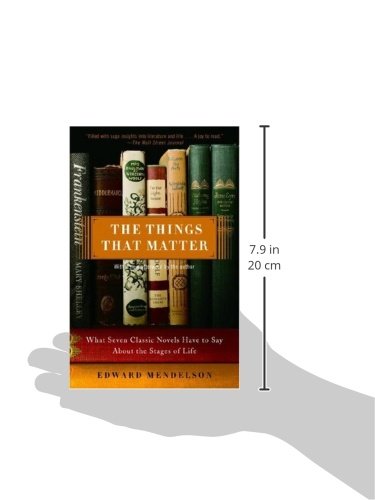
Edward Mendelson choses classic novels to illustrate the various stages of Life. You might wonder why Mendelson picked THREE novels by Virginia Woolf. Or why Mendelson included novels all written by women. As you read The Things That Matter (2007), you start to unravel the logic behind Medelson’s choices. Admittedly, these are quirky choices. Thinking about Birth doesn’t immediately conjure up Mary Shelley’s Frankenstein. Rebirth maybe… And with marriage at the center of Middlemarch, George Eliot’s novel seems more about Bad Choices to me. Mrs. Dalloway, To The Lighthouse, and Between the Acts skews The Things That Matter to the things that matter to Virginia Woolf. All of these writers question the state of women. Mendelson’s book might spur you to revisit these classic novels. GRADE: B
TABLE OF CONTENTS:
Introduction p. xi
1 Birth: Frankenstein p. 3
2 Childhood: Wuthering Heights p. 47
3 Growth: Jane Eyre p. 79
4 Marriage: Middlemarch p. 115
5 Love: Mrs. Dalloway p. 160
6 Parenthood: To the Lighthouse p. 204
7 The Future: Between the Acts p. 227
Afterword to the Anchor Books Edition p. 241
Notes on the Novelists p. 245
Further Reading p. 247
Acknowledgments p. 253
Index p. 255
The only one’s I have read are Frankenstein , Wuthering Heights, Mrs. Dalloway and To the Lighthouse. Liked Frankenstein, found Wuthering Heights okay and hated both by Woolf. I would rather poke myself in the eye with a sharp stick than have to read Mrs. Dalloway again.
Steve, I know several people who have that reaction to Virginia Woolf’s work.
Have read them all and liked them all to various degrees, but I almost feel that Mendelson had a few essays laying around unpublished and thought to himself, “Hmmm—how can I string these together and make them into a book?”
Deb, you might be right about Mendelson’s motives.
I can’t object to the use of all novels by women because so often all novels written by men appear on lists of favorites. Witness George Pelecanos on By the Book in the Times. However, Virginia Woolf is one of my least favorite writers and Middlemarch was unreadable to me. So I certainly question the women he chose. Strange that the editor/publisher did not protest. Also how about some diversity in the nationality of the selections?
Patti, I struggled to finish MIDDLEMARCH. I enjoyed George Eliot’s other novels, but her “masterpiece” really dragged for me.
Too bad this has to be about gender instead of quality of the writing. I sure wish we could all just be humans, instead of divisions based on gender, race and religion (and, these days, party politics).
Rick, tribalism seems to be the flavor of the day.
Any list that doesn’t include Harold Robins is meaningless anyway.
Dan, well said!
I thought it was just me and MIDDLEMARCH. I’ve tried repeatedly. And THREE Virginia Woolfs? That’s just nuts. I’ll pass.
Jeff, I prefer Woolf’s essays to her fiction. MIDDLEMARCH was a slog for me. I know a lot of people who love MIDDLEMARCH. I’m just not one of them.
George – Thanks for the post, but I will pass, too.
Elgin, THE THINGS THAT MATTER is an odd book. I enjoyed reading it, but it left me with a lot of questions.
Although I’ve actually read four of them, including two by Woolf, this is a pretty strange selection. MIDDLEMARCH and MOBY-DICK have, for years, been the two novels at the top of my bucket list. But I’m afraid that reading either of them will do me in and I’ll never get to the other one.
Michael, I’d recommend MOBY-DICK over MIDDLEMARCH. I’ve been told there’s a great audiobook version of MOBY-DICK out there.
Strange selections, strange book. I wonder why it was even published.
As for Woolf, I’ve just one: Mrs. Dalloway which was strongly character-centric and boring in places, though I finished it. I’ve not been tempted to try any of her other books. I’ve read two of the other books, a long time ago.
Rick, I’m with you on Mendelson’s choices. Quirky, to say the least.
I did read TO THE LIGHTHOUSE, better than MRS. DALLOWAY.
Frankenstein I’ve read of course – the others I don’t remember.
Here in Europe there was a different selection of US authors available anyway and usually I went to the “America House” and started a book – if I didn’t like the first pages, switched to another one.
There were so many books to read! 🙂
Wolf, I wish more European works were translated into English and made available in affordable editions.
Just popping back in to give a word of support for MIDDLEMARCH which is one of my all-time favorite novels (Virginia Woolf said it was the wisest novel in the English language, so you may want to judge whether you should read MIDDLEMARCH based on how much you value Woolf’s critical assessment). It’s a massive, sprawling work but at its heart it’s the story of a woman who makes a rather impulsive marriage and tries to do her best when she realizes her folly.
Incidentally, MIDDLEMARCH was the book I was reading in the days before and after the birth of my oldest child. In all the hospital and newborn pictures, you can see the thick green spine of MIDDLEMARCH somewhere in the frame. Never let it be said that Deb let a trifling thing like labor keep her from reading!
Deb, Henry James wrote a book about a woman who makes a Bad Decision and marries Mister Wrong…and tries to do her best when she realizes her folly, too. THE PORTRAIT OF A LADY deals with many of the themes of MIDDLEMARCH. It’s been decades since I read MIDDLEMARCH. Maybe I should reread it… I found your reading during labor story inspiring!